What is Enterprise Application Development? And It’s Benefits
Enterprise application development is the process of creating, implementing, and maintaining software solutions that address certain specific business needs of an organization. Enterprise apps are created with specific purposes and the practice of creating such apps is becoming standard in most companies today.
Modern-day enterprises want to digitize and automate multiple aspects of their day-to-day business operations. For them, investing in enterprise software development services is the first step towards becoming fully digitized.
Why? Well, enterprise apps process enormous amounts of business data, minimize internal bureaucracy, improve a firm’s remote management capacity, and drastically cut down the amount of paper waste workers generate.
In other words, an enterprise app can instantly digitize several aspects of any organization. Enterprise apps can also boost business agility and help company leaders automate various aspects of their enterprise, such as project management, supply chain management, content management, and resource planning.
In this article, we will explore everything that businesses need to know about the current state of enterprise application development. Here are the main topics that we will cover in this article:
- What is enterprise application development?
- Types of enterprise application development (with examples)
- Key benefits of enterprise software development for businesses
What is Enterprise Application Development?
Enterprise application development is the process of creating enterprise apps. In terms of intended use, there are two types of enterprise apps:
- Company-Specific Enterprise Apps: These apps are designed specifically for a particular organization. Such an app will provide industry-specific solutions and support specific core business functions. It will also be customized to align with the organization’s day-to-day operations and business requirements.
Large multinational companies, governments, and private organizations create company-specific enterprise apps to manage, optimize, and secure their private data.
Here are some examples of company-specific enterprise apps:
- WalmartOne from Walmart is an enterprise app that gives employees direct access to all work-related information (daily schedules, paystubs, etc.).
- DeltaNet by Delta Airlines allows employees to access work-related info and company news.
- Archways to Opportunity, an enterprise app from McDonald’s that provides educational and career-related info to employees.
2. General Enterprise Apps: These enterprise apps offer broad solutions that apply to multiple industries and workforces. General enterprise apps are scalable and their target audiences include employees from all types of industries.
Here are some examples of general enterprise apps:
- Slack, a collaboration tool used by workforces across the world.
- Zoom, a video conferencing platform that enables remote work.
- Google Workspace, a suite of enterprise tools including email, document editing, and more.
Companies don’t need to invest in enterprise software development services to use popular general enterprise apps as they are easily available to businesses and individual employees. But, to create company-specific apps they will either need professional enterprise software development services or an in-house software development team.
Different Types of Enterprise Application
We have reviewed the two types of enterprise apps on the basis of their intended use. Now, let’s assess the different types of enterprise apps on the basis of the functions they serve. This is a broad domain because the top providers of enterprise and SaaS application development services have created custom apps for pretty much every business function imaginable.
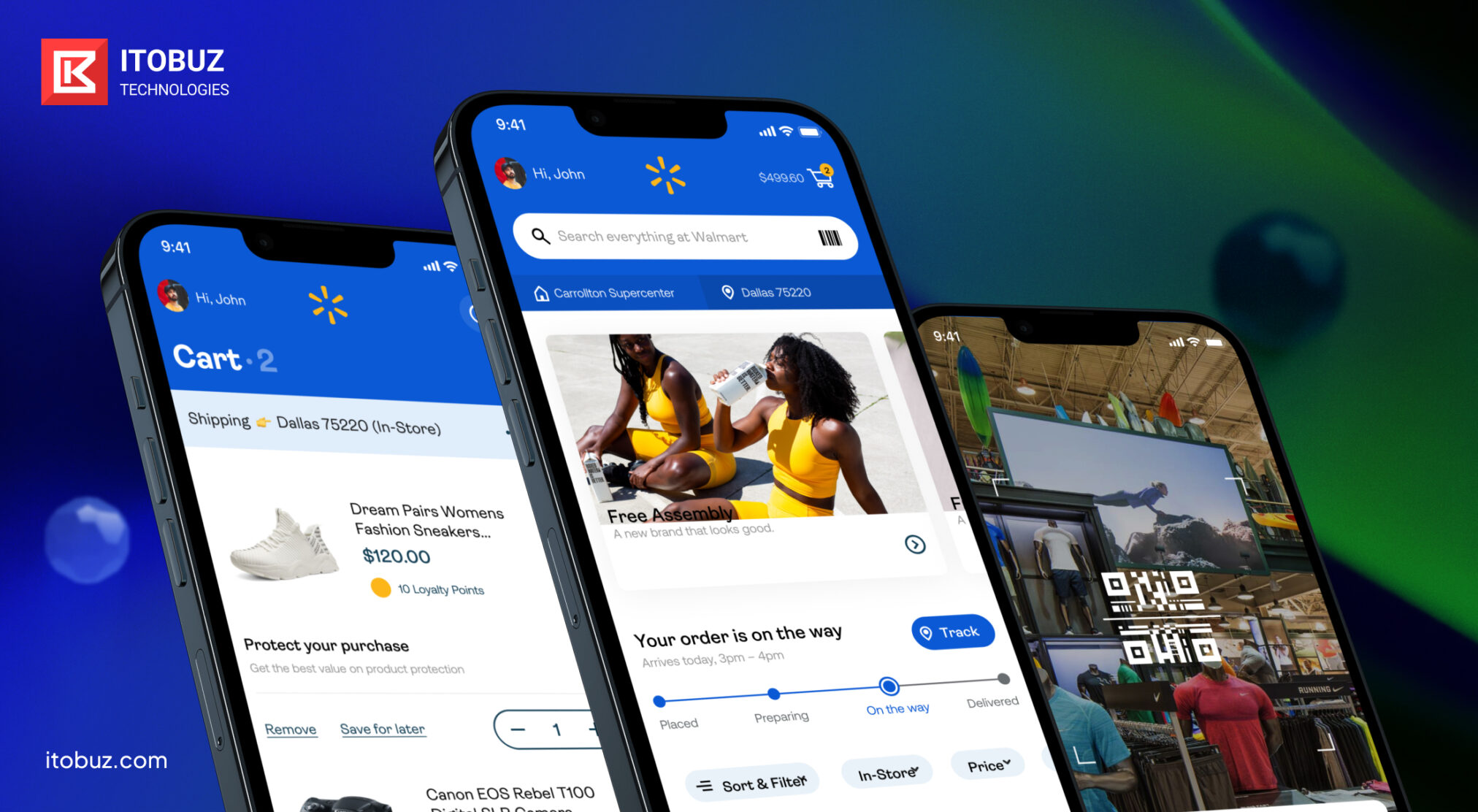
“Have a business problem? There’s an app for that!” – this is the motto the top providers of enterprise application development services follow. With this in mind, let’s explore the diverse world of enterprise apps:
1. Enterprise Resource Planning (ERP) Apps
Enterprise Resource Planning (ERP) apps integrate different business functions and processes into a single platform. These functions and processes can range from cost control, inventory management, accounting sales planning, and more. Here is a visual depiction of some key business functions and processes that can be performed on a unified ERP app:
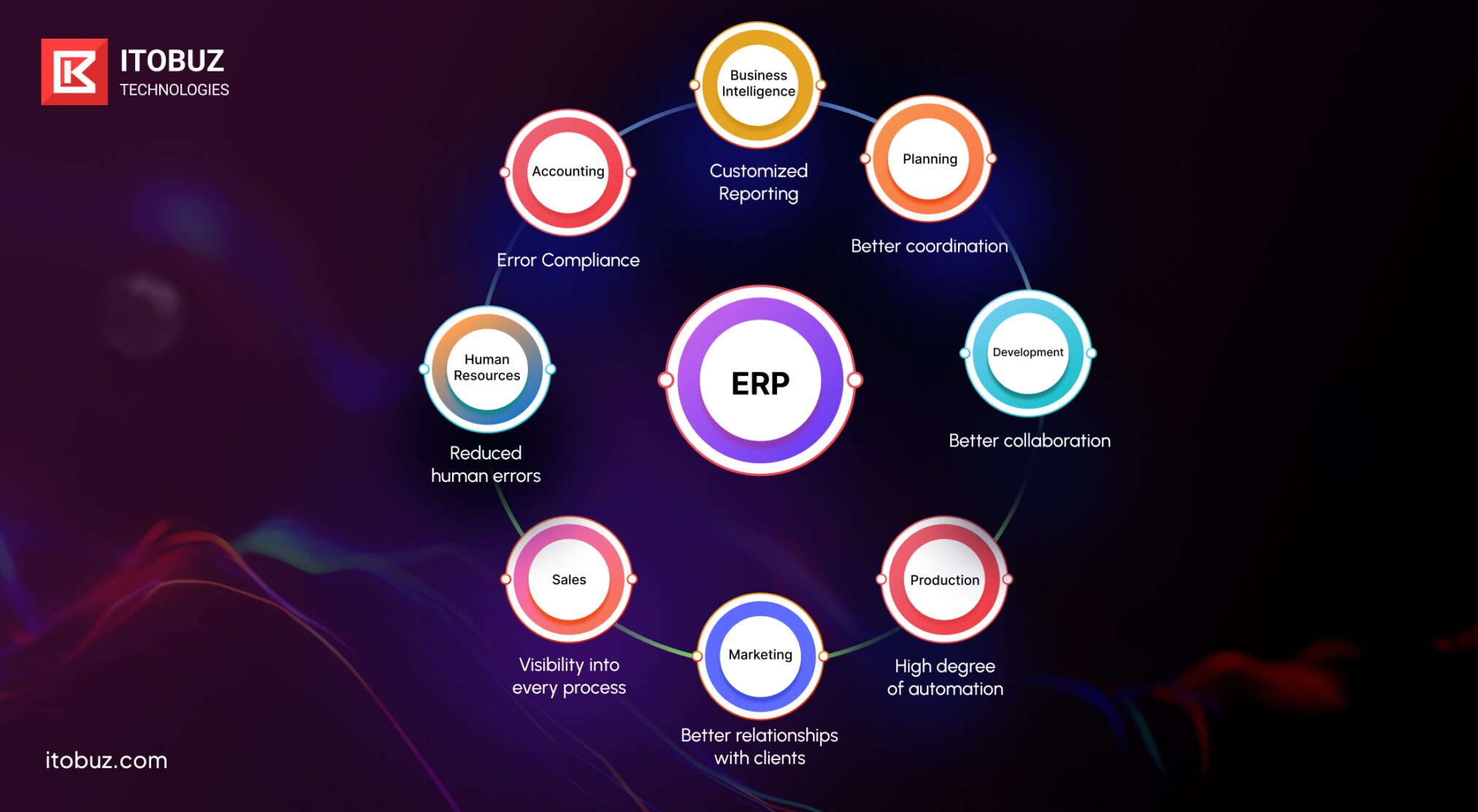
The most popular ERP solutions of today are all cloud-based and used by different types of companies across various industries. They include Microsoft Dynamics 365 Business Central, SAP S/4HANA Cloud, Acumatica, Oracle JD Edwards, Blue Link ERP, and Oracle Fusion Cloud.
2. Customer Relationship Management (CRM) Apps
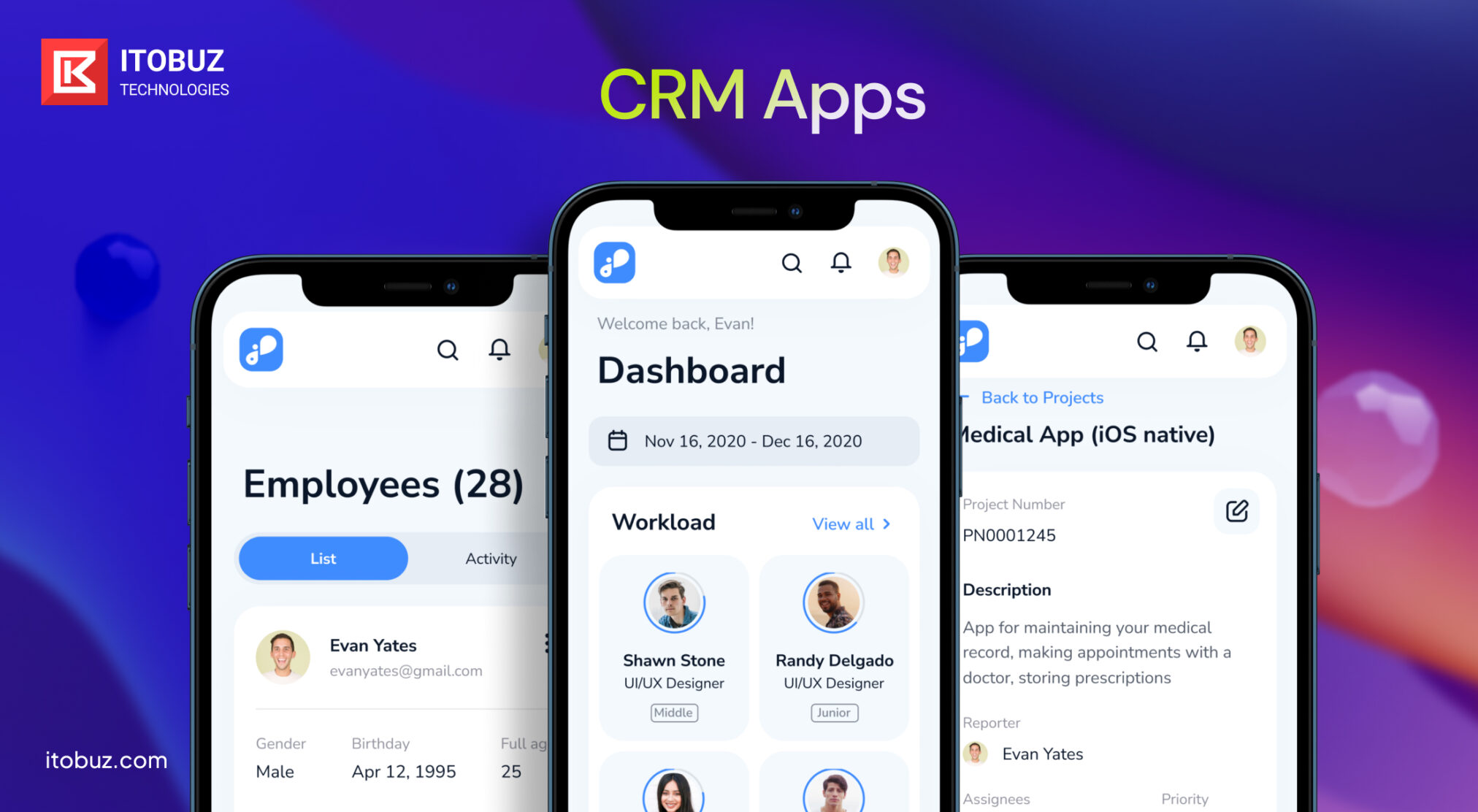
CRM apps are designed to help companies store, manage, and optimize all of their customer data and client relationships via one unified platform. This includes their contact information, transaction summaries, digital relationships, and customer service requests.
CRM apps allow companies to give their workforces convenient access to all of these brand communication channels via one live and updateable platform. Some examples of popular CRMs include Zoho, HubSpot, Salesforce, and Microsoft Dynamics
3. Business Intelligence (BI) Apps
BI apps help companies collect, analyze, and optimize all the data they generate from various sources, such as accounting, sales, HR, etc. These tools also present data in the form of worker-friendly visuals like charts/graphs. Understanding complex business data is easier this way.
BI tools further enhance the workers’ understanding of business data by giving them direct access to a variety of data analysis tools. These built-in tools in BI apps can be used to make business decisions or predictions.
Some examples of popular BI apps include Salesforce, Microsoft Power BI, Tableau, etc.
4. Human Resource Management (HRM)
These software tools help HR departments streamline and simplify their work. Recruiters can accelerate the hiring process by using these tools to filter CVs, find info on candidates on LinkedIn, generate keyword-optimized job descriptions, etc.
HR managers can use these tools to store employee data, track employee attendance, assist in performance reviews, etc. Some examples of popular HRM apps include Zimyo, Keka, Wallet HR, Bamboo HR, PeopleForce, etc.
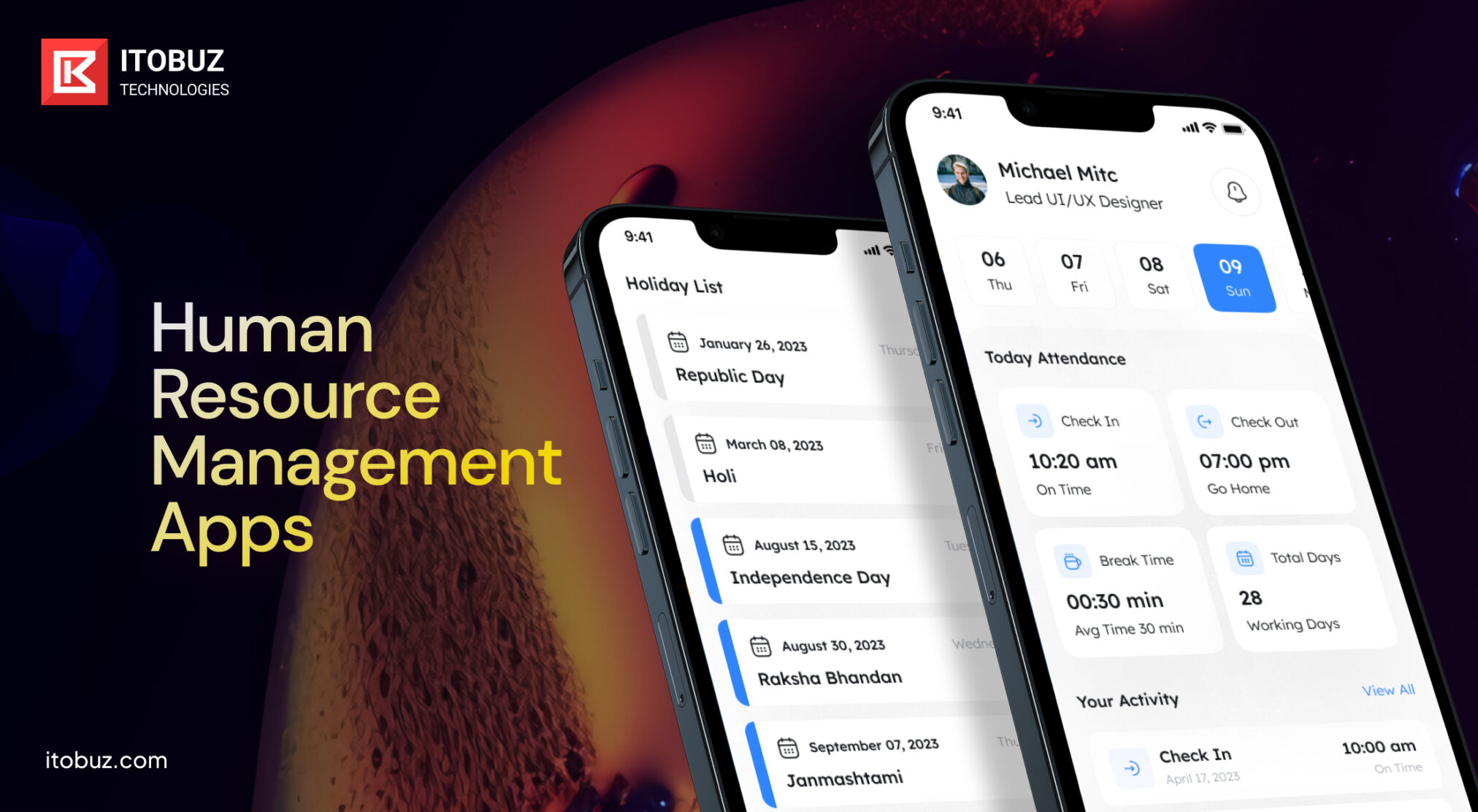
5. Supply Chain Management (SCM) Apps
These enterprise apps help businesses track inventory, manage shipping, improve delivery efficiency, optimize transportation, and more. In other words, they help companies manage their supply chains in transparent, compliant, and time-efficient ways. The main players in the SCM app market are Oracle, ShipBob, IBM, and Conexiom.
6. Payroll Management Software
Payroll administration is a critical responsibility of the HR department. HR professionals can use payroll management software to automate various aspects of their payroll processes. This includes: automating wage/tax calculations, maintaining payroll records for employees, and ensuring all transactions are in compliance with relevant tax laws.
Some common examples of payroll management enterprise apps include ADP Global-View Payroll, Gusto, On-Pay, Paychex Flex, and Rippling.
7. Content Management System (CMS)
A Content Management System (CMS) is a software application that allows businesses to create, edit, publish, and archive digital content from one user-friendly interface. Even workers with no coding or technical knowledge can use these tools to produce, manage, and modify the digital content on their websites.
The most standard examples of CMS enterprise apps include Magneto, Joomla, WordPress, Wix, and Drupal.
8. Marketing Automation Software
Just like a CMS makes it easier for content creation teams to achieve efficient results with minimal effort, marketing automation software does the same for marketing teams. These tools allow marketers to automate tasks like cross-channel tracking and user behavior analysis.
9. Order Management Software (OMS)
An OMS is a software solution that allows businesses to effortlessly track, process, and oversee order fulfillment-related tasks from one unified platform. From accepting orders to inventory management payment processing to delivery tracking: all of these tasks can be performed on order management software tools like ShipStation, NetSuite, Zoho Inventory, and Brightpearl.
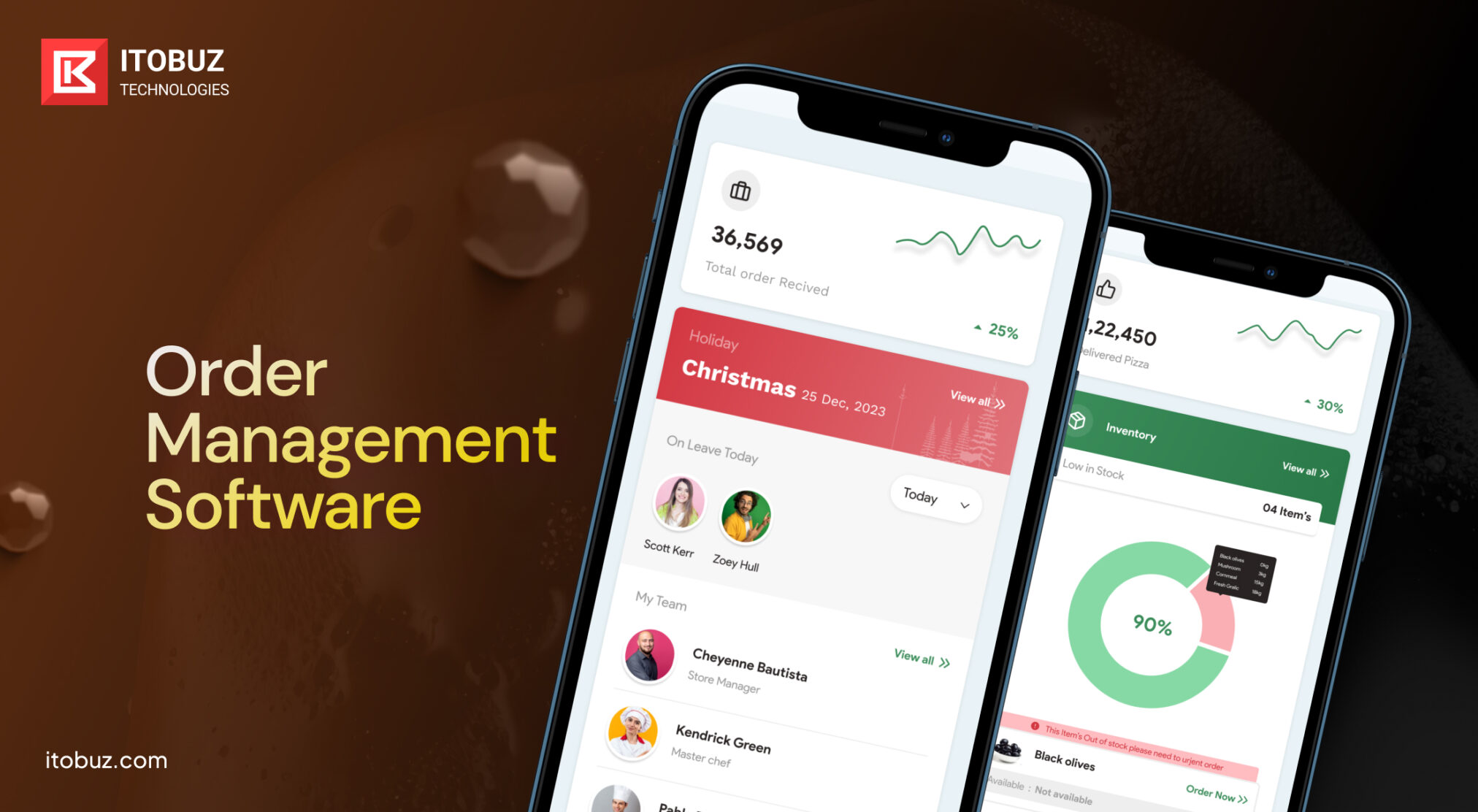
There are several other enterprise apps that serve niche functions in select industries that we did not include in this list. They include hotel management tools like Little Hotelier and Flip.to, real estate industry apps like Glide, and secure messaging apps like Slack.
You can find more examples of enterprise apps on Capterra and G2: two technology review platforms that connect sellers of enterprise apps to potential buyers. We reviewed the top enterprise apps on the two websites to find the most highly-rated apps of 2023:
| Enterprise App Category | Top-Rated Enterprise App | Capterra Rating | G2 Rating |
| Business Intelligence | Datamine | 4.8 | 4.6 |
| Customer Relationship Management | Salesforce | 4.4 | 4.3 |
| Accounting Software | QuickBooks Enterprise | 4.5 | 4.2 |
| Presentations/Content Design | Visme | 4.5 | 4.5 |
| Payment Processing | Stripe | 4.7 | 4.4 |
| HR Recruiting | ICIMS Talent Cloud | 4.3 | 4.1 |
| Marketing Automation | Sendinblue | 4.6 | 4.5 |
| Content Management | WordPress | 4.6 | 4.6 |
| Project Management | monday.com | 4.6 | 4.7 |
| Enterprise Resource Planning | Sage | 4.1 | 4.3 |
| Order Management | Brightpearl | 4.4 | 4.4 |
| Customer Service | Zendesk | 4.4 | 4.4 |
(Source)
The Benefits of Enterprise Applications
Now that we have a clear idea of all the major players in the world of enterprise application development, let’s see how these tools and services can actually help companies/
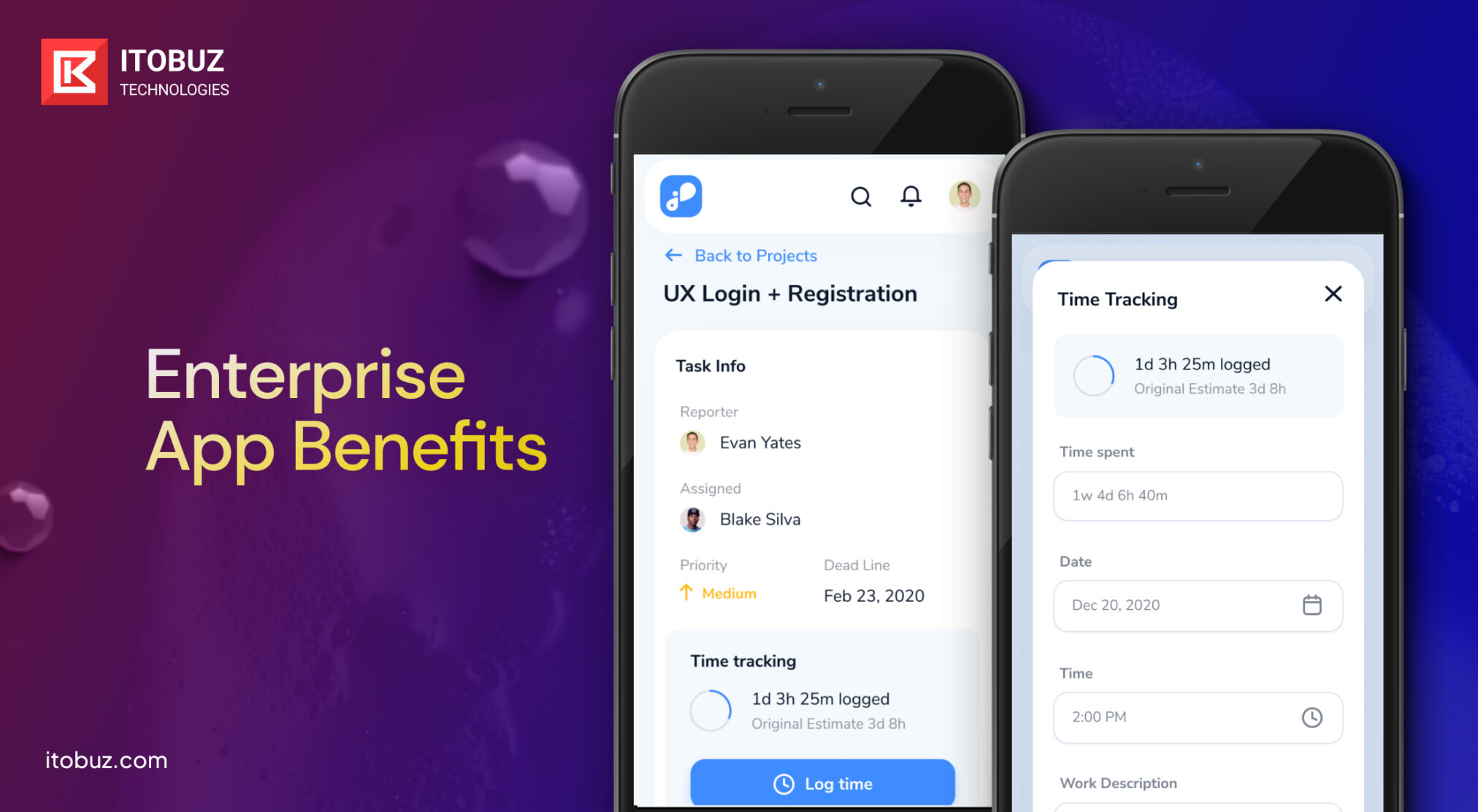
Automating Low-Value Tasks
The most-used enterprise apps are the ones that automate common, low-value tasks. These apps help employees spend more time on more important, revenue-focused activities. For example, a supply chain management app like Oracle or Conexiom will instantly automate low-value tasks like taking stock of inventory, notifying supply chain operators, etc.
An enterprise app will also record every low or high-value task it performs. These records can give company leaders new insights into their business. The apps may help them unearth inefficiencies that they would never have considered otherwise.
Another amazing thing about all the extra information enterprise apps record and present is that it all happens in real time. Company leaders can get accurate snapshots of their routine business operations anytime they want from one unified platform.
The Productivity Payoff
Enterprise apps automate various aspects of their routine operations. This frees up time for company leaders to focus on the core, ‘non-automatable’ functions of their businesses. Even better, workers can manually explore the data sets collected by their enterprise apps.
Then, they can creatively map the relationships between different data classes and data points to derive even newer insights. For example:
- Exploring the relationship between client demographics and sales data can help companies identify their most profitable customer segments.
- Customer service representatives can use CRM apps to identify patterns in the types of customer complaints they receive. They can take data-based decisions to improve specific aspects of their customer service.
There are several other ways companies can drastically enhance workforce productivity and efficiency after integrating enterprise applications into their routine operations.
Efficient Resource Planning
As a business grows, so does the data it accumulates needs to store and manage on a routine basis. this data can either be an unusable burden or a valuable asset. An enterprise app can be the difference-maker in making this data the latter.
Enterprise Resource Planning (ERP) applications like Microsoft Dynamics 365 are designed to help businesses use their data to identify business inefficiencies, make data-driven decisions, and accurately track the impact of these decisions. What follows is refinement.
Essential business processes like resource planning, keep getting refined until they’re optimized for cost and time efficiency. Plus, all members of the organization get convenient access to a single, centralized data management framework.
An ERP suite gives workforces the ability to remotely monitor, track, and analyze multiple business functions. An ERP app can instantly produce in-depth reports and analytics in real time as it will always have access to a central source of facts.
Data Security
Security is a huge deal in the world of enterprise software development because these apps have to store and manage highly private company data. Whenever brands license enterprise apps or hire high-quality enterprise software development services, they also get to install the best data leakage prevention measures for their data.
Automate Business Workflows
Enterprise apps can not only automate business tasks and functions. They can automate entire workflows. Customer service reps can use enterprise apps to automate the process of sending out follow-up emails to customers until their grievances are addressed. Enterprise apps can automate approvals and notifications that are sent to workers as well.
Higher Scalability
One of the key features of new-age enterprise apps is that they are modular and flexible. That means each program in a new-age enterprise app will be configured to work both autonomously and in conjunction with the rest of the programs in the software.
Enterprise app developers can ask business leaders to choose the areas of software that they want to focus on. Then, they can further refine those aspects of the app. For example, if your workers need better access to customer information, enterprise app developers can add that feature to their products.
Final Take
If you want your business to consistently perform better than it did last month, you will have to do what the top businesses are already doing: integrate enterprise applications into your routine operations.
Forward-thinking company leaders are always looking for ways to cut costs and refine their operations. Enterprise apps enable them to do exactly that.
So, no matter what technology roadmap you want your business to follow, enterprise apps will be unavoidable milestones on that map.
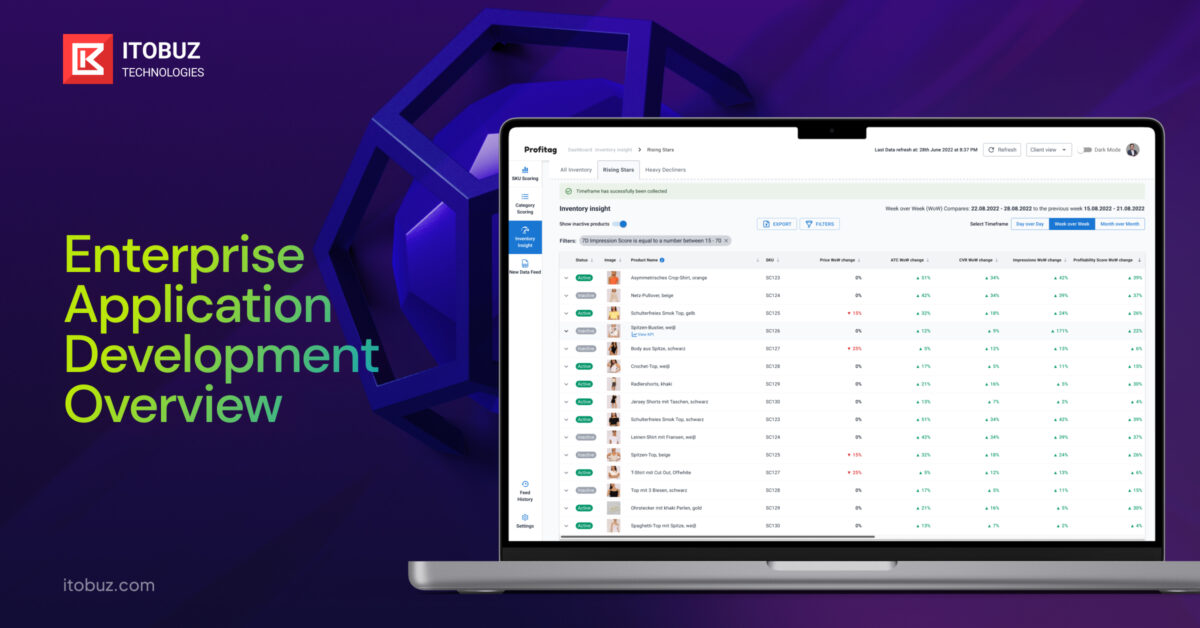
comments
comments for this post are closed